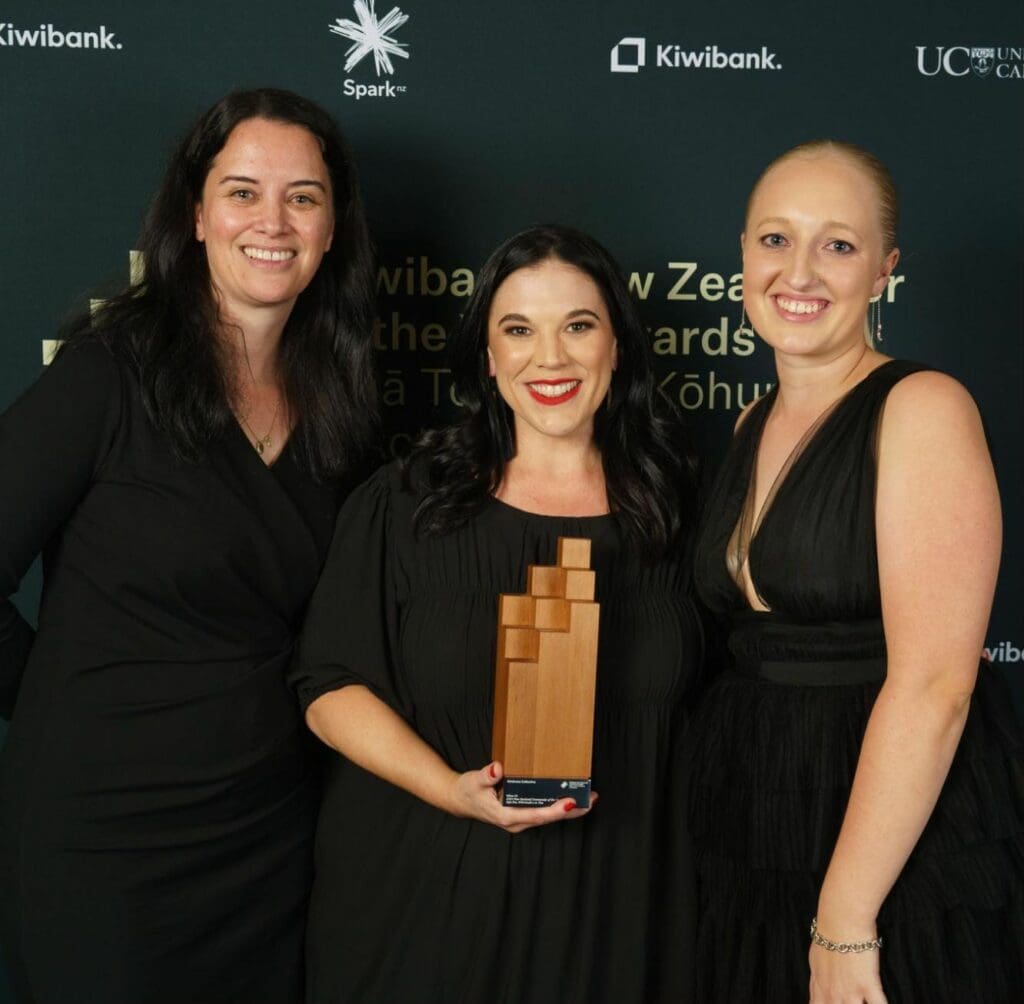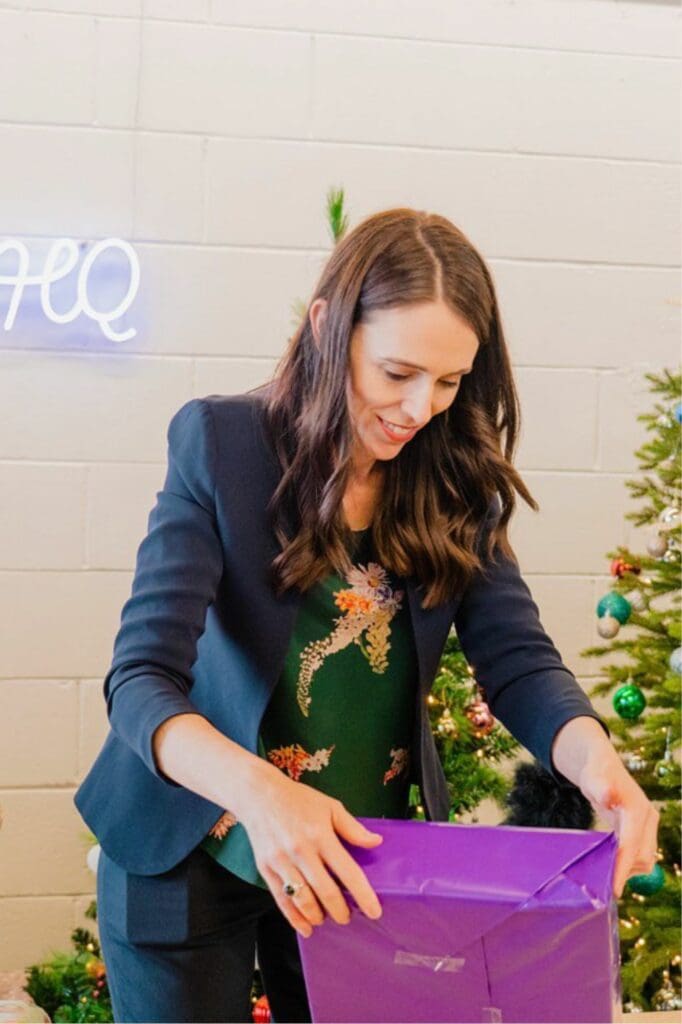If you don’t know Sarah Page’s name or face, you may very well have heard of her charity – the Kindness Collective, or one of their charity projects, like their Christmas Joy Store which gave Xmas presents to children and families who would otherwise go without.
She’s also been on the telly a fair bit lately, because the Kindness Collective was recognised at the New Zealander of the Year awards, taking out Community of the Year.
“It was really, really cool and very unexpected,” says Sarah. “It was a really nice acknowledgement, because it’s not just us, it’s not just our team, it’s everyone in our community. It’s the social workers, the teachers and nurses – all of us working together collaboratively to really reduce the symptoms of poverty for families.”
Although it came as a shock to Sarah, for anyone looking in, what she and her team – and the community around them – do, is absolutely incredible, and inspiring.
The Kindness Collective is a nationwide charity that connects children and families with the day-to-day essentials that they need. “But, we also provide what we call ‘moments of joy’,” says Sarah. “Because we recognise if you’re a family that’s finding it tough, then the little bits of joy that come along like birthdays or Christmas aren’t always on the cards.”
They work with 103 community partners around the country, including Te Whatu Ora, and the Police and have a food bank, toy bank, toiletries and clothes. Plus, they do big projects like the Christmas Joy Store, and The PJ Project, which they’re in the midst of right now. That one is all about providing warm winter pjs to thousands of children all across the country, who would otherwise go without.
“We work with 92 different services around the country to provide children in their care with warm winter pjs,” says Sarah. “It’s really simple – you can donate on our website and we turn them into pajamas or you can drop off pjs to our drop-off points.”
And those kids need your help. Sarah says they’re sitting at around 8,200 pairs right now, which is well below their goal this year of 15,000.

Which unfortunately is a real sign of the times. Sarah says demand out there for The Kindness Collective’s help is only skyrocketing, while donations are only becoming harder to come by.
We had a chat with Sarah – who, along with her husband, gave up their jobs to work full-time at the charity – to get a better picture as to how things are really looking out there, her personal struggles and how she deals with the overwhelm and the constant threat of burnout.
How are you today, Sarah?
Am I allowed to answer honestly?
YES! Please do!
Honestly, today I’m feeling burnt out and just bloody tired. At the same time, I feel grateful every day to be able to do what I do and to be able to help the number of people that we help, but I’m also just feeling a bit jaded today by how tough it is now for charities now. I’ve been speaking to a few friends in the sector, and we’re all feeling like it’s this slow wade through mud at the moment.
Far out, and fair enough! I can imagine some of the reasons why it’s a difficult time for charities at the moment – the soaring cost of living and the gnarly start to the year we’ve had. There’s a real feeling of scarcity out there at the moment.
Absolutely. We already started 2023 already a bit tired, with a half-drained tank and then floods hit, and then a cyclone and now the cost-of-living crisis is really a crisis, and not just a news headline.
We’ve been helping a lot of people affected by both weather events in Northland, Auckland, Waikato and Hawke’s Bay (and all surrounding regions) and we’ve seen a huge increase in need since. This year has been tough on everyone, absolutely, but it’s affecting people who were already living in hardship the most.
The cost-of-living crisis is affecting charities too, because those people who once donated more frequently to charities, now have an increased mortgage rate, increased food prices, power – everything is more expensive. So often, charity donations are the first thing to go.
God, Sarah. This is seriously tough stuff. And I can imagine for you this is two-fold: not only are you having a much bigger struggle to raise donations, but at the same time, you’re facing a skyrocketing need out there for help.
The referrals for day-to-day essentials are increasing every single day for most charities we know. And a lot of the stories we hear are from hard-working families with two parents working many hours to make ends meet, and at the end of the week they’re just not meeting. They’ve gone to WINZ, or whoever for help and are being turned away.
Their social workers or community nurses or the school principals are coming to us and saying, ‘This whānau needs food, or toiletries, or blankets this week, can you help” and of course, we say yes. The problem is the referrals are more frequent from every community partner but donations are down, so it’s a tough juggle.
Let’s back up a bit here for readers who might not be that familiar with you or your story. They can head back and read our first story with you here. But, could you tell us how you started up The Kindness Collective? It was shortly after your son was diagnosed with autism, and not all that long after you’d experienced post-natal depression, right?
Yes. My son was born in 2012 and I experienced quite bad postnatal depression soon after his birth. Every early on he was diagnosed with severe Autism at 18 months old and our lives quickly changed to be about getting him as much help and support as we could.
I spent so much time researching and reading and learning and ended up on all these community groups for families with Autism in New Zealand. It became really apparent really quickly that unless you had money you couldn’t access support.
I was seeing these families with children with Autism (sometimes more than one) just going through tough times with no support for their kids. Many couldn’t access teacher aides, or speech and language therapy or anything for their kids, but also many couldn’t even afford to feed them.
It was a massive wake-up call and I immediately started looking for ways to help people. I realized quickly I couldn’t help those kids in those community groups, but I could try and do something to help and make myself feel better about the situation.
I started by getting all the food from my pantry, my friends and family’s pantries and dropping it off at an independent women’s refuge safe house for families in need there. That relationship started that way with those women and changed my life for the second time. From there KC grew to 50 people helping out with drives and Christmas collections, then it grew to 500, to 5,000 and in 2020 we registered as a charity and now have a nationwide charity helping over 120,000 people a year.
Wow Sarah. When you take a step back and look at that, what you’ve done, how does that feel?
It feels surreal, but I also live every single day with the knowledge that it’s never going to be enough. No matter how hard I work, it’s never going to be enough.
Ten years into it, I’m both proud of what we’ve achieved but I also know we shouldn’t have to exist in the first place – there shouldn’t have to be charities. Everyone in New Zealand should be born into a system where they are set up to succeed and have everything they need to do so.
That makes complete sense to me. Now, this is nothing like what you do, but I remember years ago, I was doing regular charity work and I said to a friend who also did (Nici Wickes actually!) that I didn’t feel like doing it some weekends and that made me feel like a bad charity person. She said something that really stuck with me – I’m paraphrasing here, but she said one of the problems with charity work is we put those people who do it in some other category, like they’re these complete selfless, wonderful angels, that are different to regular folk. But the reality is, people who do charity work are just regular people, who love doing their bit, but definitely don’t enjoy every minute of it and sometimes get so over it, and so angry and resentful, yet they keep going, because it’s the right thing to do.
Yes, absolutely. I’m not a saint, or a hero, or an angel. I’m just a regular person who turns up to work every day at 7 am and keeps trying because I can’t unsee poverty now. I don’t want people to tell me I’m amazing. I just want them to help.
That sounds incredibly overwhelming Sarah. What do you do to take care of you amongst this all?
I focus on the joy. Like today I’m feeling angry, but I will always just focus on the joy and look at the kindness of strangers.
You know, New Zealanders are really kind people – although you could easily be mistaken if you look at the Herald story comments, we are. I see every day the kindness of Kiwis through our generous community that help where and when they can.
We just went through a pandemic together and then two big weather events and people just got stuck in and helped where they could. They rallied together and helped their neighbors clean up trees from driveways, cleaned out silt, and fed and clothed their children, all kinds of amazing gestures, and so that’s what I choose to focus on.
Your Instagram is always full of the good. And you do seem to have a lot of people who stop by to pitch in. I saw Jacinda Ardern came to help at Christmas
Yes, I’ve known her personally for years through mutual mates, so asked if she’d stop by and have a wee look. She visited and (badly) wrapped a present and spent some time with some of our social services and teen parents. Terrible pressie wrapper, a fantastic Prime minister and woman, so we’ll let her off the wrapping. [Laughs]


Okay, I’ll let you get back to it Sarah, but to finish up, my God, there must be people reading this now, who, like myself feel motivated to help right now. So what can we do?
I mean, if you want to support the Kindness Collective, we’ve got all these different projects we do during the year and if you’re based in Auckland you can come down to our community centre and drop off some new, unopened, non-perishable food that we can put into food boxes or you can join the PJ Project or one of the different projects that we do.
But in general, it doesn’t have to be us. Just find a cause, something that resonates with you and brings you joy. Give money, give time, whatever that charity needs. Get in touch, ask them what they need and lend a hand. It can be anyone, anywhere – everyone will appreciate it, whether it’s time or money, big or small, it all counts and it all makes a difference.


